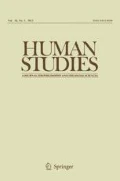Abstract
This article defends methodological and theoretical pluralism in the social sciences. While pluralistic, such a philosophy of social science is both pragmatic and normative. Only by facing the problems of such pluralism, including how to resolve the potential conflicts between various methods and theories, is it possible to discover appropriate criteria of adequacy for social scientific explanations and interpretations. So conceived, the social sciences do not give us fixed and universal features of the social world, but rather contribute to the task of improving upon our practical knowledge of on-going social life. After arguing for such a thorough-going pluralism based on the indeterminacy of social action, I defend it from the post-modern and hermeneutic objections by suggesting the possibility of an epistemology of interpretive social science as a form of practical knowledge.
Similar content being viewed by others
References
Bohman, James. 1991. New Philosophy of Social Science: Problems of Indeterminacy. Cambridge: MIT/Polity Press.
Bohman, James. 1996a. “Causal Pluralism Without Levels,” The Southern Journal of Philosophy 32 (supplementary volume of the Spindel Conference 1995): 115–128.
Bohman, James. 1996b. Public Deliberation: Democracy, Pluralism and Complexity. Cambridge: MIT Press.
Bohman, James. 1997. “Do Practices Explain Anything? On Stephen Turner's The Social Theory of Practices,” History and Theory 36(1): 93–107.
Bohman, James. Forthcoming. “Practical Agency and Cultural Constraint,” in R. Shusterman (Ed.), Bourdieu: A Critical Reader. London: Basil Blackwell.
Bohman, James and Terrence Kelly. 1996. “Rationality, Intelligibility and Comparison: The Rationality Debates Revisited,” Philosophy and Social Criticism 22(1): 88–100.
Bourdieu, Pierre. 1990. The Logic of Practice. Cambridge: Polity Press.
Bourdieu, Pierre. 1991. Language and Symbolic Power. Cambridge: Polity Press.
Brandom, Robert. 1994. Making It Explicit: Reasoning, Representing and Discursive Commitment. Cambridge: Harvard University Press.
Douglas, Mary. 1986. How Institutions Think. Syracuse: Syracuse University Press.
Elster, Jon. 1989. Nuts and Bolts for the Social Sciences. Cambridge: Cambridge University Press.
Elster, Jon. 1983. Explaining Technical Change. Cambridge: Cambridge University Press.
Fay, Brian. 1993. Review of New Philosophy of Social Science, American Political Science Review 87(3): 197–198.
Geertz, Clifford. 1986. “The Uses of Diversity,” Michigan Quarterly Review 10(2): 105–123.
Habermas, Jürgen. 1984. The Theory of Communicative Action. Volume I. Boston: Beacon Press.
Habermas, Jürgen. 1985. “Questions and Counterquestions,” in R. Bernstein (Ed.), Habermas and Modernity. Cambridge: Polity Press.
Habermas, Jürgen. 1987. The Theory of Communicative Action. Volume II. Boston: Beacon Press.
Habermas, Jürgen. 1990. “Reconstruction and Interpretation in the Social Sciences,” in Moral Consciousness and Communicative Action. Cambridge: MIT Press.
Hacking, Ian. 1982. “Language, Truth and Reason,” in M. Hollis and S. Lukes (Eds.), Rationality and Relativism. Cambridge: MIT Press.
McCarthy, Thomas. 1985. “Reflections on Rationalization in The Theory of Communicative Action”, in R. Bernstein (Ed.), Habermas and Modernity. Cambridge: Polity Press, 1985.
McCarthy, Thomas. “Doing the Right Thing in Cross-Cultural Representation,” Ethics 102(2): 635–649.
Roth, Paul. 1995. Review of New Philosophy of Social Science, Metaphilosophy 12(3): 440–448.
Author information
Authors and Affiliations
Rights and permissions
About this article
Cite this article
Bohman, J. Pluralism, Indeterminacy and the Social Sciences: Reply to Ingram and Meehan. Human Studies 20, 441–458 (1997). https://doi.org/10.1023/A:1005357623902
Issue Date:
DOI: https://doi.org/10.1023/A:1005357623902



